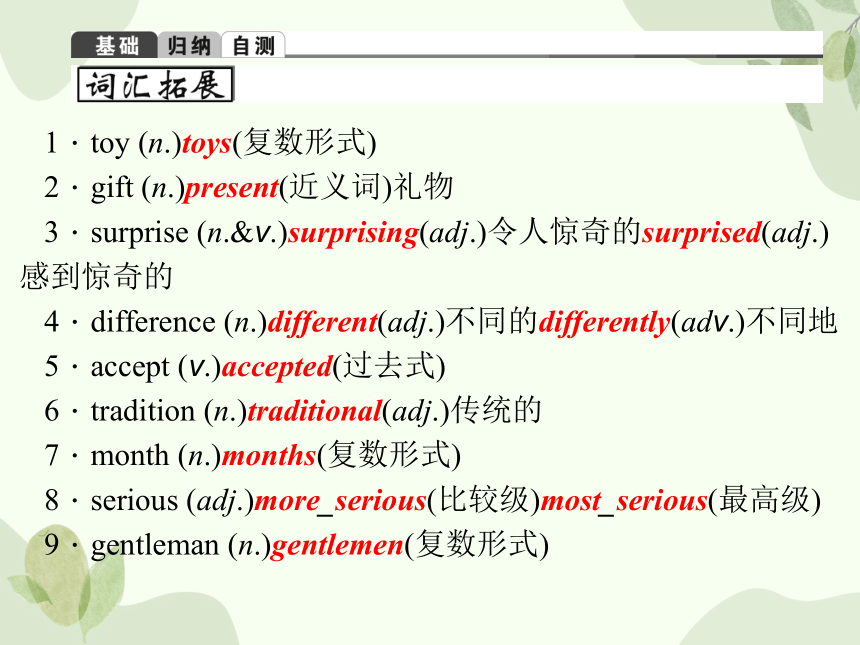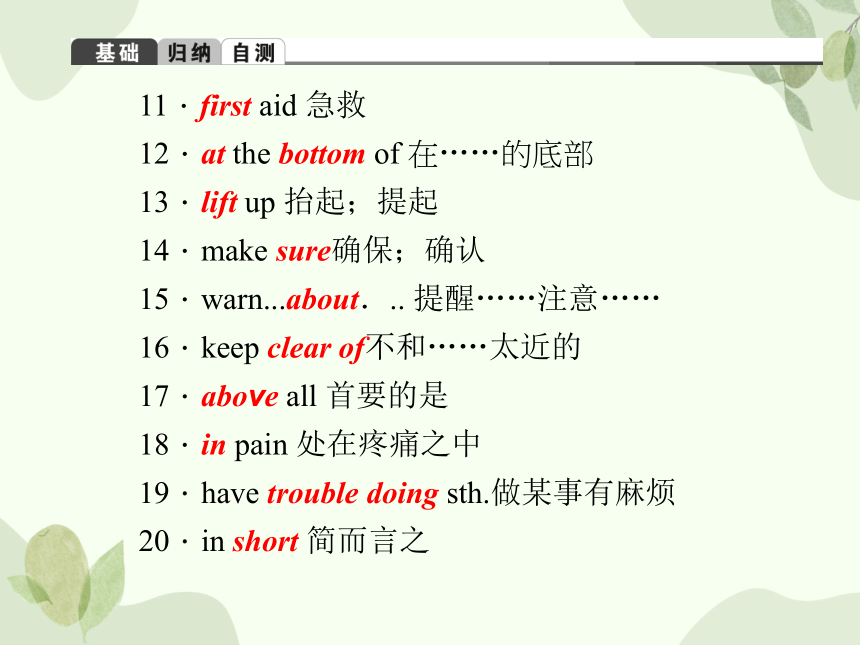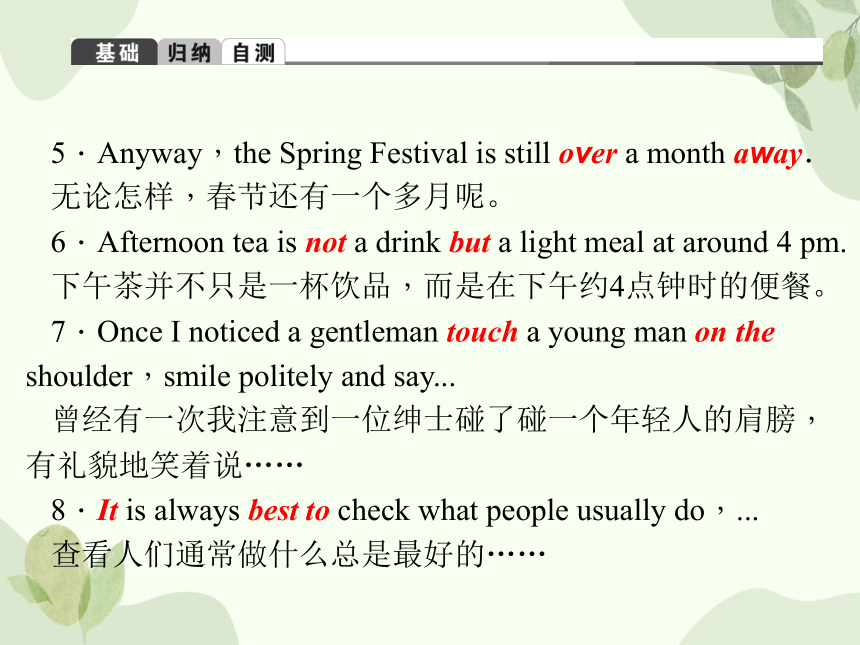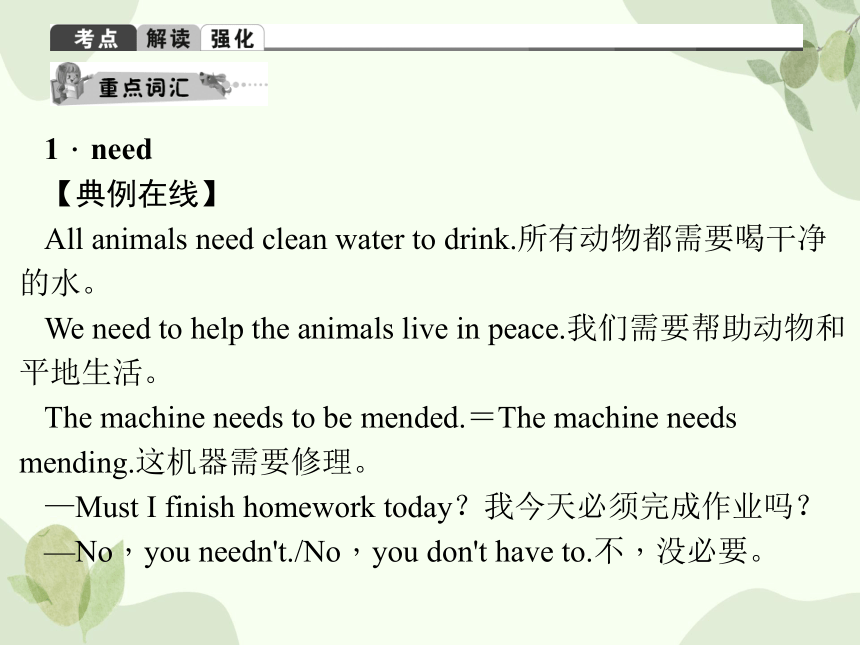外研版英语八年级上册Module 12Unit 3 Language in use (2)课件(共35张PPT)
文档属性
| 名称 | 外研版英语八年级上册Module 12Unit 3 Language in use (2)课件(共35张PPT) |

|
|
| 格式 | ppt | ||
| 文件大小 | 569.0KB | ||
| 资源类型 | 教案 | ||
| 版本资源 | 外研版 | ||
| 科目 | 英语 | ||
| 更新时间 | 2024-09-29 20:09:55 | ||
图片预览












文档简介
(共35张PPT)
Modules 11~12
1.toy (n.)toys(复数形式)
2.gift (n.)present(近义词)礼物
3.surprise (n.&v.)surprising(adj.)令人惊奇的surprised(adj.)感到惊奇的
4.difference (n.)different(adj.)不同的differently(adv.)不同地
5.accept (v.)accepted(过去式)
6.tradition (n.)traditional(adj.)传统的
7.month (n.)months(复数形式)
8.serious (adj.)more_serious(比较级)most_serious(最高级)
9.gentleman (n.)gentlemen(复数形式)
10.break (v.)broke(过去式)broken(过去分词)
11.harmful (adj.)harm(n.)伤害
12.drop (v.)dropped(过去式)dropping( ing形式)
13.keep (v.)kept(过去式)
14.clear (adj.&v.)clearly(adv.)显然地
15.brave (adj.)bravely(adv.)勇敢地
16.help (n.&v.)helpful(adj.)有益的
1.for example 例如
2.for the first time 首次;初次
3.a chess set 一副国际象棋
4.do some cleaning 打扫卫生
5.bad luck 倒霉
6.shake hands 握手
7.light meal 便餐;便饭
8.clean up 打扫干净
9.wash up 洗刷;饭后洗餐具
10.can't wait to 迫不及待
11.first aid 急救
12.at the bottom of 在……的底部
13.lift up 抬起;提起
14.make sure确保;确认
15.warn...about... 提醒……注意……
16.keep clear of不和……太近的
17.above all 首要的是
18.in pain 处在疼痛之中
19.have trouble doing sth.做某事有麻烦
20.in short 简而言之
1.You needn't wait!
你不必等了。
2.You can't be serious!
你不可能是认真的。
3.And you had better not cut your hair during the Spring Festival month.
在春节那个月期间你最好不要理发。
4.I don't think I should open it now.
我认为我现在不应该打开它。
5.Anyway,the Spring Festival is still over a month away.
无论怎样,春节还有一个多月呢。
6.Afternoon tea is not a drink but a light meal at around 4 pm.
下午茶并不只是一杯饮品,而是在下午约4点钟时的便餐。
7.Once I noticed a gentleman touch a young man on the shoulder,smile politely and say...
曾经有一次我注意到一位绅士碰了碰一个年轻人的肩膀,有礼貌地笑着说……
8.It is always best to check what people usually do,...
查看人们通常做什么总是最好的……
9.That could be harmful!
那可能会有伤害!
10.Make sure he's warm.
确保他是暖和的。
11.What's wrong with him
他怎么了?
12.Make him comfortable.
让他舒适。
1.need
【典例在线】
All animals need clean water to drink.所有动物都需要喝干净的水。
We need to help the animals live in peace.我们需要帮助动物和平地生活。
The machine needs to be mended.=The machine needs mending.这机器需要修理。
—Must I finish homework today?我今天必须完成作业吗?
—No,you needn't./No,you don't have to.不,没必要。
【拓展精析】
need作实义动词,意为“需要”,其结构形式有:
sb.+need+n./pron.某人需要某物;
sb.+need+to do sth.某人需要做某事;
sth.+need to be done=sth.need doing某事需要被做。
need作情态动词,通常用于否定句或疑问句中,后接动词原形,无人称、时态和数的变化;
needn't作为“Must...?”句式的否定回答,相当于“...not have to”。
need还可作名词意为“需要”。
【活学活用】
(1)Children __D__ sit in the front seat of a car.It's too dangerous.(2014,重庆)
A.need B.needn‘t
C.must D.mustn't
(2)—Must I be in hospital for a week,doctor
—No,you __A__.You can go back home tomorrow.
A.needn't B.mustn't C.can't D.don't
(3)The car needs washing(wash).=The car needs
to be washed.
2.surprise
【典例在线】
To our surprise,he failed in the test.=We are surprised he failed in the test.令我们吃惊的是他考试没通过。
I was surprised at the news about his death.=I was surprised to hear the news about his death.他去世的消息令我感到震惊。
The result surprised us.=We were surprised to hear the result.这个结果使我们感到惊讶。
【拓展精析】
surprised形容词,意为“感到惊讶的”,描述人的情绪或状态。be surprised at sth.因某事而惊讶。
surprising形容词,意为“令人惊讶的”,描述物或事。
surprise名词,意为“惊讶”。to one's surprise出乎某人意料之外(一般作插入语,放在句首,用逗号隔开)。
in surprise惊讶地,表示方式和态度。类似短语:in person亲自地,in silence静静地。
surprise动词,意为“使……惊讶”。
【活学活用】
(4)We are__C__to hear the________result.
A.surprised;surprised
B.surprising;surprising
C.surprised;surprising
D.surprising;surprised
(5)He stood there in__A__.
A.surprise B.surprising
C.surprised D.surprises
3.had better
【典例在线】
It seems that it is going to rain.You'd better take an umbrella.似乎要下雨了,你最好带一把雨伞。
You'd better not throw the rubbish on the ground.你最好不要把垃圾扔在地上。
【拓展精析】
had better可以看成情态动词,其后接动词原形,否定式在had better后加not,即had better not do sth.。had better意思是“最好”,常用于提建议。
【活学活用】
(6)You'd better __A__ there.It's dangerous.
A.not go B.not to go
C.not go to D.not to
(7)You'd better __D__ the water until it has been boiled.
A.not drunk B.not drinking
C.not to drink D.not drink
1.What's wrong with him?他怎么了?
【典例在线】
What's wrong with you?你怎么了?
What's wrong with your eyes?你的眼睛怎么了?
【拓展精析】
What's wrong with...?意为“……怎么了?”,常用来询问对方所遇到的麻烦事或询问某人患了何种疾病。
表示这一意义的其他常用口语表达还有:
What's the matter?怎么了?
What's up?出什么事了?
What's the trouble?有什么麻烦吗?
What happened?发生了什么事?
Is there anything wrong?有什么不对劲吗?
【活学活用】
(1)—__A__?
—I have a sore throat.
A.What's the matter B.What's the wrong
C.What's trouble D.What's matter
(2)—Haven't seen you for ages,Mike.__C__?
—Pretty good.Everything goes well.
A.What are you doing B.How are you
C.How's it going D.What's wrong.
1.accept,receive
【典例在线】
He accepted our invitation happily.他高兴地接受了我们的邀请。
I received her photos two days ago.两天前我收到了她的照片。
【拓展精析】
accept作接受讲时,着重指一个人的态度,表示主语主动、情愿地接受,而且其后的宾语一般不能省略;receive一般指通过邮递等方式“收到,接到”,它强调主语收到了(某物),但并不含有接收人是否愿意接受的意思。
【活学活用】
(1)Will you accept my invitation
(2)I received a present just now,but I'm not going to accept it.
2.may,might,can,could,must,can't
【典例在线】
He may know.他可能知道。
The French book might be Kathy's.She studies French.这本法语书可能是凯西的。她学法语。
It's true that some ads can be very useful.有些广告可能非常有用,这是真的。
He could be running for exercise.他可能正在跑步锻炼。
The notebook must be Ming's.It has her name on it.这个笔记本一定是明的。上面有她的名字。
The T shirt can't be John's.It's much too small for him.这件衬衫不可能是约翰的。它对他来说太小了。
【拓展精析】
may表示现在或将来的可能性,意为“可能”;might表示更加怀疑和不肯定。
must表示肯定推测,意为“一定是;肯定是”。
can't表否定推测,意为“不可能是”。
【活学活用】
(3)__A__ I see your ID card,sir?We have to check your information.(2013,河北)
A.May B.Must C.Should D.Need
(4)—Where are you going this month?(2013,天津)
—We __C__ go to Xiamen,but we're not sure.
A.needn't B.must C.might D.mustn't
(5)—Are you interested in shopping online
—Not so much.We __B__ see real products but pictures.(2013,台州)
A.shouldn't B.can't
C.mustn't D.needn't
3.for example,such as,like
【典例在线】
For example,you must say Mr or Mrs when you meet someone for the first time.例如,当你第一次见到某人时你必须称呼先生或夫人。
I like fruits,such as apples,pears and bananas.我喜欢水果,比如苹果、梨和香蕉。
They have been to European countries like France,Italy and Germany.他们去过法国,意大利和德国等欧洲国家。
【拓展精析】
三者都可以用来列举,for example用句子来举事例,for example可以放在句首,句中或句末。放在句首要用逗号隔开,放在句中前后都要用逗号隔开。such as和like用来列举事物,such as和like不能接句子,应接名词,代词或动名词。such as前面用逗号隔开,而like之前不用逗号。
【活学活用】
(6)The girl is very careful,__A__,she always makes a plan before doing anything.
A.for example B.such as
C.like D.as
(7)3 D打印机能打印各种东西,比如汽车、飞机甚至人体某些部位,很神奇。(2014,乐山)
It's amazing that 3 D printing can copy many different things,such as cars,airplanes and even human body parts.
1.If you __C__ smoke,please go outside.(2014,杭州)
A.can B.may C.must D.might
2.The man is feeling much better now,so you __A__ call a doctor.(2014,重庆B)
A.needn't B.can't C.mustn't D.shouldn't
3.—Must I wash all the clothes this afternoon
—No,you __A__.
A.don't have to B.mustn't
C.can't D.may not
4.—Simon,what do I need to take for the hiking
—You'd better __B__ more water than usual.It's hot today.(2014,南京)
A.to take B.take C.taking D.took
5.What I said __A__ them,they looked at me in ________.
A.surprised;surprise B.surprising;surprise
C.surprised;surprised D.surprising;surprising
6.There aren't many tickets left for the concert,you'd better __C__ that you get one today.(2013,青岛)
A.make sure of B.make a decision
C.make sure D.make plans
7.Not he but I __B__ right,others all agree with me.
A.is B.am C.are D.be
8.I really enjoy the noodles and vegetables.They __C__ delicious.
A.stay B.feel C.taste D.sound
9.—There is a science show in our city.
—Really?Be sure __D__ it.You'll learn a lot from it.
A.miss B.of missing
C.not miss D.not to miss
10.—Is everyone here
—No.On the playground are some students,__C__ Jim and his friends.
A.for example B.for instance
C.such as D.like
记叙文类写作(二)——叙事记叙文
叙事类书面表达主要用于说明事件的时间、背景、起因、过程及结果,即我们通常所说的五个“W”(what,who,when,where,why)和一个“H”(how)。记叙的重点在于“叙述”和“描写”,因此一篇好的记叙文要叙述条理清楚,描写生动形象。
一、叙事记叙文写作注意事项
1.主题要明确,文中所有内容都要围绕主题展开。
2.勿漏六要素。一篇记叙文通常要包含6要素,即故事发生的时间(when);以及发生的地点(where);人物角色是谁(who);发生的是什么事(what);发生的原因(why);以及事件的结果是如何造成的(how)。
3.合理运用“顺叙”“倒叙”和“插叙”的方法,但初学者最好采用“顺叙”的方法。
4.注意人称、数及时态的一致性和连贯性。
二、常见有用表达
1.On Sunday/...,we had a picnic/went to... 在星期天/……,我们去野炊/……
2.We planned to... 我们计划去……
3.This morning,we got up... 今早,我们起床……
4.We took a bus/rode a bike... 我乘公交/骑车……
5.We climbed the hill/went boating... 我们去爬山/去划船……
6.What a terrible/happy...! 多么难过/开心……
三、写作热身
回答下列问题:
1.What activity did you take part in
2.What time did you do it
3.What did you do and see
4.How do you feel
四、经典作文展示
假设你是李华,上周末你参加了一次郊游(outing)。请根据下面表格中的提示信息写一篇题为“A Pleasant Outing”的英语短文,参加某英文报纸的征文比赛。
A Pleasant Outing
时间 上周末
参加者 你和……
地点 北山公园(the North Hill Park)
活动 骑自行车、爬山、野餐、做游戏……
感受 ……
要求:1.不要逐条翻译表格中的信息,可适当增减内容;2.短文中不得出现真实的地点、人名和校名;3.词数:80~100个。
参考词汇:go for an outing;climb the hill;have a picnic
【美文欣赏】
A Pleasant Outing
Last weekend,I went for an outing with my classmates.At 7:30 in the morning,we met at our school gate.We went to the North Hill Park by bike.On the way,we were so excited that we sang loudly.When we arrived there,we started to climb the hill at once.We had a picnic on the top of the hill.After that,we walked down the path and had a rest.Later,some girls danced under the trees and some boys played games happily.We didn't go back until 4:00 pm.We were tired but very happy.
What a pleasant outing it was!
Modules 11~12
1.toy (n.)toys(复数形式)
2.gift (n.)present(近义词)礼物
3.surprise (n.&v.)surprising(adj.)令人惊奇的surprised(adj.)感到惊奇的
4.difference (n.)different(adj.)不同的differently(adv.)不同地
5.accept (v.)accepted(过去式)
6.tradition (n.)traditional(adj.)传统的
7.month (n.)months(复数形式)
8.serious (adj.)more_serious(比较级)most_serious(最高级)
9.gentleman (n.)gentlemen(复数形式)
10.break (v.)broke(过去式)broken(过去分词)
11.harmful (adj.)harm(n.)伤害
12.drop (v.)dropped(过去式)dropping( ing形式)
13.keep (v.)kept(过去式)
14.clear (adj.&v.)clearly(adv.)显然地
15.brave (adj.)bravely(adv.)勇敢地
16.help (n.&v.)helpful(adj.)有益的
1.for example 例如
2.for the first time 首次;初次
3.a chess set 一副国际象棋
4.do some cleaning 打扫卫生
5.bad luck 倒霉
6.shake hands 握手
7.light meal 便餐;便饭
8.clean up 打扫干净
9.wash up 洗刷;饭后洗餐具
10.can't wait to 迫不及待
11.first aid 急救
12.at the bottom of 在……的底部
13.lift up 抬起;提起
14.make sure确保;确认
15.warn...about... 提醒……注意……
16.keep clear of不和……太近的
17.above all 首要的是
18.in pain 处在疼痛之中
19.have trouble doing sth.做某事有麻烦
20.in short 简而言之
1.You needn't wait!
你不必等了。
2.You can't be serious!
你不可能是认真的。
3.And you had better not cut your hair during the Spring Festival month.
在春节那个月期间你最好不要理发。
4.I don't think I should open it now.
我认为我现在不应该打开它。
5.Anyway,the Spring Festival is still over a month away.
无论怎样,春节还有一个多月呢。
6.Afternoon tea is not a drink but a light meal at around 4 pm.
下午茶并不只是一杯饮品,而是在下午约4点钟时的便餐。
7.Once I noticed a gentleman touch a young man on the shoulder,smile politely and say...
曾经有一次我注意到一位绅士碰了碰一个年轻人的肩膀,有礼貌地笑着说……
8.It is always best to check what people usually do,...
查看人们通常做什么总是最好的……
9.That could be harmful!
那可能会有伤害!
10.Make sure he's warm.
确保他是暖和的。
11.What's wrong with him
他怎么了?
12.Make him comfortable.
让他舒适。
1.need
【典例在线】
All animals need clean water to drink.所有动物都需要喝干净的水。
We need to help the animals live in peace.我们需要帮助动物和平地生活。
The machine needs to be mended.=The machine needs mending.这机器需要修理。
—Must I finish homework today?我今天必须完成作业吗?
—No,you needn't./No,you don't have to.不,没必要。
【拓展精析】
need作实义动词,意为“需要”,其结构形式有:
sb.+need+n./pron.某人需要某物;
sb.+need+to do sth.某人需要做某事;
sth.+need to be done=sth.need doing某事需要被做。
need作情态动词,通常用于否定句或疑问句中,后接动词原形,无人称、时态和数的变化;
needn't作为“Must...?”句式的否定回答,相当于“...not have to”。
need还可作名词意为“需要”。
【活学活用】
(1)Children __D__ sit in the front seat of a car.It's too dangerous.(2014,重庆)
A.need B.needn‘t
C.must D.mustn't
(2)—Must I be in hospital for a week,doctor
—No,you __A__.You can go back home tomorrow.
A.needn't B.mustn't C.can't D.don't
(3)The car needs washing(wash).=The car needs
to be washed.
2.surprise
【典例在线】
To our surprise,he failed in the test.=We are surprised he failed in the test.令我们吃惊的是他考试没通过。
I was surprised at the news about his death.=I was surprised to hear the news about his death.他去世的消息令我感到震惊。
The result surprised us.=We were surprised to hear the result.这个结果使我们感到惊讶。
【拓展精析】
surprised形容词,意为“感到惊讶的”,描述人的情绪或状态。be surprised at sth.因某事而惊讶。
surprising形容词,意为“令人惊讶的”,描述物或事。
surprise名词,意为“惊讶”。to one's surprise出乎某人意料之外(一般作插入语,放在句首,用逗号隔开)。
in surprise惊讶地,表示方式和态度。类似短语:in person亲自地,in silence静静地。
surprise动词,意为“使……惊讶”。
【活学活用】
(4)We are__C__to hear the________result.
A.surprised;surprised
B.surprising;surprising
C.surprised;surprising
D.surprising;surprised
(5)He stood there in__A__.
A.surprise B.surprising
C.surprised D.surprises
3.had better
【典例在线】
It seems that it is going to rain.You'd better take an umbrella.似乎要下雨了,你最好带一把雨伞。
You'd better not throw the rubbish on the ground.你最好不要把垃圾扔在地上。
【拓展精析】
had better可以看成情态动词,其后接动词原形,否定式在had better后加not,即had better not do sth.。had better意思是“最好”,常用于提建议。
【活学活用】
(6)You'd better __A__ there.It's dangerous.
A.not go B.not to go
C.not go to D.not to
(7)You'd better __D__ the water until it has been boiled.
A.not drunk B.not drinking
C.not to drink D.not drink
1.What's wrong with him?他怎么了?
【典例在线】
What's wrong with you?你怎么了?
What's wrong with your eyes?你的眼睛怎么了?
【拓展精析】
What's wrong with...?意为“……怎么了?”,常用来询问对方所遇到的麻烦事或询问某人患了何种疾病。
表示这一意义的其他常用口语表达还有:
What's the matter?怎么了?
What's up?出什么事了?
What's the trouble?有什么麻烦吗?
What happened?发生了什么事?
Is there anything wrong?有什么不对劲吗?
【活学活用】
(1)—__A__?
—I have a sore throat.
A.What's the matter B.What's the wrong
C.What's trouble D.What's matter
(2)—Haven't seen you for ages,Mike.__C__?
—Pretty good.Everything goes well.
A.What are you doing B.How are you
C.How's it going D.What's wrong.
1.accept,receive
【典例在线】
He accepted our invitation happily.他高兴地接受了我们的邀请。
I received her photos two days ago.两天前我收到了她的照片。
【拓展精析】
accept作接受讲时,着重指一个人的态度,表示主语主动、情愿地接受,而且其后的宾语一般不能省略;receive一般指通过邮递等方式“收到,接到”,它强调主语收到了(某物),但并不含有接收人是否愿意接受的意思。
【活学活用】
(1)Will you accept my invitation
(2)I received a present just now,but I'm not going to accept it.
2.may,might,can,could,must,can't
【典例在线】
He may know.他可能知道。
The French book might be Kathy's.She studies French.这本法语书可能是凯西的。她学法语。
It's true that some ads can be very useful.有些广告可能非常有用,这是真的。
He could be running for exercise.他可能正在跑步锻炼。
The notebook must be Ming's.It has her name on it.这个笔记本一定是明的。上面有她的名字。
The T shirt can't be John's.It's much too small for him.这件衬衫不可能是约翰的。它对他来说太小了。
【拓展精析】
may表示现在或将来的可能性,意为“可能”;might表示更加怀疑和不肯定。
must表示肯定推测,意为“一定是;肯定是”。
can't表否定推测,意为“不可能是”。
【活学活用】
(3)__A__ I see your ID card,sir?We have to check your information.(2013,河北)
A.May B.Must C.Should D.Need
(4)—Where are you going this month?(2013,天津)
—We __C__ go to Xiamen,but we're not sure.
A.needn't B.must C.might D.mustn't
(5)—Are you interested in shopping online
—Not so much.We __B__ see real products but pictures.(2013,台州)
A.shouldn't B.can't
C.mustn't D.needn't
3.for example,such as,like
【典例在线】
For example,you must say Mr or Mrs when you meet someone for the first time.例如,当你第一次见到某人时你必须称呼先生或夫人。
I like fruits,such as apples,pears and bananas.我喜欢水果,比如苹果、梨和香蕉。
They have been to European countries like France,Italy and Germany.他们去过法国,意大利和德国等欧洲国家。
【拓展精析】
三者都可以用来列举,for example用句子来举事例,for example可以放在句首,句中或句末。放在句首要用逗号隔开,放在句中前后都要用逗号隔开。such as和like用来列举事物,such as和like不能接句子,应接名词,代词或动名词。such as前面用逗号隔开,而like之前不用逗号。
【活学活用】
(6)The girl is very careful,__A__,she always makes a plan before doing anything.
A.for example B.such as
C.like D.as
(7)3 D打印机能打印各种东西,比如汽车、飞机甚至人体某些部位,很神奇。(2014,乐山)
It's amazing that 3 D printing can copy many different things,such as cars,airplanes and even human body parts.
1.If you __C__ smoke,please go outside.(2014,杭州)
A.can B.may C.must D.might
2.The man is feeling much better now,so you __A__ call a doctor.(2014,重庆B)
A.needn't B.can't C.mustn't D.shouldn't
3.—Must I wash all the clothes this afternoon
—No,you __A__.
A.don't have to B.mustn't
C.can't D.may not
4.—Simon,what do I need to take for the hiking
—You'd better __B__ more water than usual.It's hot today.(2014,南京)
A.to take B.take C.taking D.took
5.What I said __A__ them,they looked at me in ________.
A.surprised;surprise B.surprising;surprise
C.surprised;surprised D.surprising;surprising
6.There aren't many tickets left for the concert,you'd better __C__ that you get one today.(2013,青岛)
A.make sure of B.make a decision
C.make sure D.make plans
7.Not he but I __B__ right,others all agree with me.
A.is B.am C.are D.be
8.I really enjoy the noodles and vegetables.They __C__ delicious.
A.stay B.feel C.taste D.sound
9.—There is a science show in our city.
—Really?Be sure __D__ it.You'll learn a lot from it.
A.miss B.of missing
C.not miss D.not to miss
10.—Is everyone here
—No.On the playground are some students,__C__ Jim and his friends.
A.for example B.for instance
C.such as D.like
记叙文类写作(二)——叙事记叙文
叙事类书面表达主要用于说明事件的时间、背景、起因、过程及结果,即我们通常所说的五个“W”(what,who,when,where,why)和一个“H”(how)。记叙的重点在于“叙述”和“描写”,因此一篇好的记叙文要叙述条理清楚,描写生动形象。
一、叙事记叙文写作注意事项
1.主题要明确,文中所有内容都要围绕主题展开。
2.勿漏六要素。一篇记叙文通常要包含6要素,即故事发生的时间(when);以及发生的地点(where);人物角色是谁(who);发生的是什么事(what);发生的原因(why);以及事件的结果是如何造成的(how)。
3.合理运用“顺叙”“倒叙”和“插叙”的方法,但初学者最好采用“顺叙”的方法。
4.注意人称、数及时态的一致性和连贯性。
二、常见有用表达
1.On Sunday/...,we had a picnic/went to... 在星期天/……,我们去野炊/……
2.We planned to... 我们计划去……
3.This morning,we got up... 今早,我们起床……
4.We took a bus/rode a bike... 我乘公交/骑车……
5.We climbed the hill/went boating... 我们去爬山/去划船……
6.What a terrible/happy...! 多么难过/开心……
三、写作热身
回答下列问题:
1.What activity did you take part in
2.What time did you do it
3.What did you do and see
4.How do you feel
四、经典作文展示
假设你是李华,上周末你参加了一次郊游(outing)。请根据下面表格中的提示信息写一篇题为“A Pleasant Outing”的英语短文,参加某英文报纸的征文比赛。
A Pleasant Outing
时间 上周末
参加者 你和……
地点 北山公园(the North Hill Park)
活动 骑自行车、爬山、野餐、做游戏……
感受 ……
要求:1.不要逐条翻译表格中的信息,可适当增减内容;2.短文中不得出现真实的地点、人名和校名;3.词数:80~100个。
参考词汇:go for an outing;climb the hill;have a picnic
【美文欣赏】
A Pleasant Outing
Last weekend,I went for an outing with my classmates.At 7:30 in the morning,we met at our school gate.We went to the North Hill Park by bike.On the way,we were so excited that we sang loudly.When we arrived there,we started to climb the hill at once.We had a picnic on the top of the hill.After that,we walked down the path and had a rest.Later,some girls danced under the trees and some boys played games happily.We didn't go back until 4:00 pm.We were tired but very happy.
What a pleasant outing it was!
同课章节目录
- Module 1 How to learn English
- Unit 1 Let's try to speak English as much as possi
- Unit 2 You should smile at her.
- Unit 3 Language in use .
- Module 2 My home town and my country
- Unit 1 It's taller than many other buildings.
- Unit 2 Cambridge is a beautiful city in the east o
- Unit 3 Language in use .
- Module 3 Sports.
- Unit 1 Nothing is more exciting than playing tenni
- Unit 2 This year we training more carefully.
- Unit 3 Language in use .
- Module 4 Planes, ships and trains .
- Unit 1 He lives the farthest from school.
- Unit 2 What is the best way to travel.
- Unit 3 Language in use .
- Module 5 Lao She Teahouse.
- Unit 1 I wanted to see the Beijing Opera.
- Unit 2 It descibes the changes in Chinese society.
- Unit 3 Language in use .
- Module 6 Animals in danger.
- Unit 1 It allows people to get closer to them .
- Unit 2 The WWF is working hard to save them all.
- Unit 3 Language in use .
- Revision module A
- Module 7 A famous story
- Unit 1 Alice was sitting with her sister by the ri
- Unit 2 She was thinking about her cat.
- Unit 3 Language in use .
- Module 8 Accidents
- Unit 1 While the car were changing to red, a car s
- Unit 2 I was trying to pick it up when it bite me
- Unit 3 Language in use .
- Module 9 Population
- Unit 1 The population of China is about 1.37 billi
- Unit 2 Arnwick was a city with 200,000 people.
- Unit 3 Language in use .
- Module 10 The weathe
- Unit 1 It might snow.
- Unit 2 The weather is fine all year round.
- Unit 3 Language in use .
- Module 11 Way of life
- Unit 1 In China ,we open a gift later.
- Unit 2 In England, you usually drink tea with milk
- Unit 3 Language in use .
- Module 12 Help
- Unit 1 What should we do before help arrives?
- Unit 2 Stay away from windows and heavy furniture.
- Unit 3 Language in use .
- Revision module B
